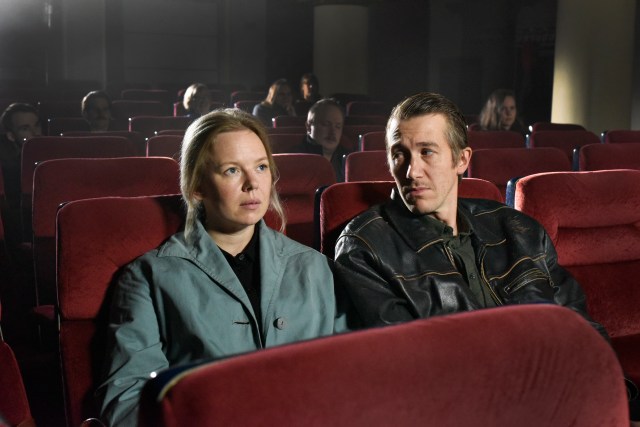‘Fallen Leaves’ review: Love wins in Aki Kaurismäki’s tender tragicomedy of the working class that finds him at his romantic best | Cannes

A title as poetic as Fallen Leaves entirely suits the fourth installment of Finnish filmmaker Aki Kaurismäki’s working-class series, which began with Shadows in Paradise, followed by Ariel and The Match Factory Girl. Even if the title invites metaphorical interpretations, the film does not need any such ornaments: it is a love story, charmingly and simply so. Twenty features in, Kaurismäki’s tragicomedies are always tender and restrained, allowing the characters to explore each other’s devotion while maintaining their own integrity. Everyone in his films yearns for love and human connection and his directorial attitude towards such universal—some may even call them ‘banal’—themes never fails them.
Fallen Leaves is a gem, with Kaurismäki at his Romantic best, gifting us a story of two strangers—aren’t we all!—who meet by chance in a Helsinki karaoke bar. Finnish actors Alma Pöysti and Jussi Vatanen, both of whose characters remain nameless (to each other and to others) for most of the film, play an unlikely couple, but from the first time they exchange looks, it’s already fated. Falling in love is a peculiar ordeal, but unmistakable in Kaurismäki’s regular cinematographer Timo Salminen’s visual style: shared silence, a stolen glance, a biting remark, a forehead kiss out of nowhere. The film is gorgeously shot on 35mm and retains the timelessness fitting for any love story. For that same reason, it could belong to an even earlier part of the director’s catalog, if we ignore a laptop and a smartphone that are mostly useless anyway.
After a first date of silent coffee drinking and a matinee of Jim Jarmusch’s The Dead Don’t Die (supplemented by some very insightful reviews such as “It reminded me of Bresson’s Diary of a Country Priest” and “To me, it’s more Bande à Part by Godard”), whatever can go wrong? A chance meeting does not guarantee smooth sailing for the two protagonists, Ansa and Holappa. On the contrary, life throws many obstacles their way: from a lost phone number to a tragic train accident, events big and small try to deter the two from coming together. These narrative decisions are perhaps the only visible device in Kaurismäki’s arsenal of seamlessly sentimental studies. Yes, such troubles advance the plot in a very traditional, literary way, but they are never taken too seriously. A certain levity in the dry humor guarantees that down the line, everything will be okay. It does help that each and every such event comes with a swelling string score, in a graciously ironic move.
At the beginning, Ansa is fired from her supermarket job because of an expired sandwich she takes home. Then, she gets a job as a kitchen porter in a pub whose owner is an evident fraud. But every time, she’s willing to change and adapt, even to factory work. With that in mind, it’s only natural that her initial fascination with Holappa would diminish, when she learns that he, however handsome and nice, is an alcoholic and can’t keep a job. Women in Kaurismäki’s films are transformatory creatures who are at once symbols of desired stability, whereas men are confused, often helpless in their romantic quest for intimacy. “All men are swine,” says Ansa’s friend. “No, that’s not true. Swine are intelligent and sympathetic,” she replies. Even such a jab carries a sweet aftertaste because it’s all said in the context of love, maybe the most important virtue for the two characters. It’s a simple story of boy meets girl, but told in a formally rigorous (think Robert Bresson in the framing, camera movements, and specific kind of automatic acting) way with zero cynicism. Aki Kaurismäki is one of the very few directors whose films, even though they bear an almost overlapping similarity, never end up repetitive or boring. Furthermore, with his absurdist Romanticism, he teaches us how to love, always with a straight face (the Finnish way).
Grade: B+
This review is from the 2023 Cannes Film Festival where Fallen Leaves premiered in competition. MUBI will release the film in the U.S.
- ‘Take Me Home’ Review: Liz Sargent’s Intimate Caregiving Drama Confronts a System Built to Fail [B-] Berlinale - February 17, 2026
- ‘It Was Just an Accident’ Review: Jafar Panahi Gives Human Answers to Complex Moral Conundrums [B] Cannes - May 23, 2025
- ‘Sirāt’ Review: Óliver Laxe Takes Us on a Sisyphean Journey of Sound and Fury Road [A-] Cannes - May 17, 2025

 53rd Annie Awards: ‘KPop Demon Hunters’ Makes History with Clean Sweep of 10 Wins
53rd Annie Awards: ‘KPop Demon Hunters’ Makes History with Clean Sweep of 10 Wins  6th Set Decorators Society of America (SDSA) Awards: ‘Frankenstein,’ ‘Hamnet,’ ‘One Battle After Another’ Take Top Honors
6th Set Decorators Society of America (SDSA) Awards: ‘Frankenstein,’ ‘Hamnet,’ ‘One Battle After Another’ Take Top Honors  76th Berlin Film Festival Awards: ‘Yellow Letters’ Wins Golden Bear for Best Film; ‘Queen at Sea’ Nabs Two Among Festival Unrest Over Politics
76th Berlin Film Festival Awards: ‘Yellow Letters’ Wins Golden Bear for Best Film; ‘Queen at Sea’ Nabs Two Among Festival Unrest Over Politics  ‘Flies (Moscas)’ Review: To Be a Fly on the Wall is to See All in Fernando Eimbcke’s Quiet Family Drama [B-] Berlinale
‘Flies (Moscas)’ Review: To Be a Fly on the Wall is to See All in Fernando Eimbcke’s Quiet Family Drama [B-] Berlinale